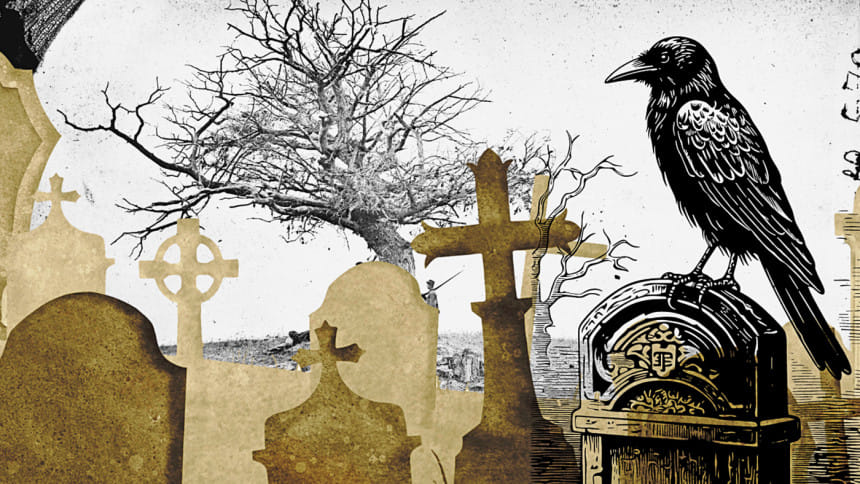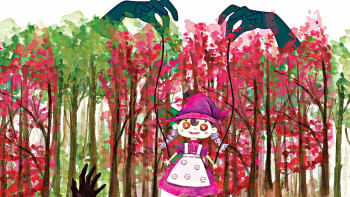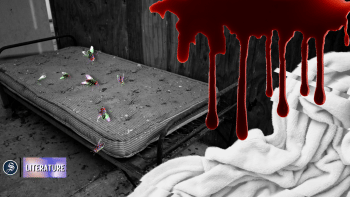The man who dug his own grave

Everyone gathered around the east end of the Shashipur to watch Sharafat Miah dig his own grave. The local kids lurked around Sharafat's old hut, keeping a watch on the progress of the grave until their mothers came to pick them up after Maghrib.
Like every other 93-year-old, Sharafat Miah's dreams were mostly about death, which didn't particularly scare him. After 70-odd years of marriage, his wife Amina had grown quite immune to the idea of her husband's death as well. With their only daughter Ruqaiyah dying at childbirth years back, it was Sharafat and Amina waiting patiently for their deaths all alone in Shashipur.
Things would've been the same if Sharafat's usual dream scenario hadn't taken an unusual turn last Wednesday. Sharafat dreamt of his and Amina's corpse rotting in their house with no one to claim their dead bodies or bury them. While Amina completely refuted the idea, Sharafat started digging his own grave in their backyard during the day and spent his nights on a cot set beside the grave.
After the initial interest by the locals, things took a sharp turn when a local newspaper came looking for a story here. "Don't you have anyone in this world who can bury you?" asked the over-enthusiastic journalist.
"I'm turning 94 this summer," said Sharafat, "We're the only ones in our family who're still alive. I might have a few cousins here and there but I haven't spoken to them in years. Amina and I, we're the only ones we've got."
"And your children? I suppose they live abroad?" nodded the journalist in sympathy.
"No, sir", smiled Sharafat, "We had a daughter, she died some years back."
"Oh", the journalist sounded rather disappointed, "Don't you blame anyone for your situation? Do you think the government has perhaps failed the people of your age?"
"I don't think so", Sharafat Miah was confused by the question. "The people have been really kind to us. In fact, my neighbour lent me the shovel I'm using."
"I don't see a story here", whispered the journalist to the cameraman, "Alright Chacha, why don't you stand there by the grave with the shovel on your back, and look at the camera?"
Sharafat wiped the dirt off his face with his lungi and smiled for the camera. "Chacha! You're digging your own grave, not coming out of it! Stop smiling", the cameraman scolded Sharafat.
Sharafat's story, along with a confused and irritated-looking picture of him, made it to a 5x5 corner of page 7 of Doinik Gomti. As fate would have it, a desperate journalist of The Dhaka Times back in the capital happened to pick it up. While the amateurs at Doinik Gomti might not have the vision to spot a story here, Dhaka Times knew how to craft one.
"Is it Sharafat Miah's grave or the nation's?" read the headlines on page 3 of The Dhaka Times the next day. The social media flooded with the news of a helpless old man digging his own grave, touching the hearts of millions from all generations. While Sharafat's cynicism made him an overnight sensation among the teens, the old people in the city could see their own reflection in Sharafat's despondency. There were debates on national television discussing whom to blame in this incident. The Nation's Party claimed that Sharafat's situation depicted a picture of the senior citizens under the ruling party and blamed the government's reign of terror. "Sharafat Miah living up to 93 years of age shows the development of the medical sector under this government," claimed the Health Minister, "If it were 2003, Sharafat Miah would've died in his '70s owing to poor healthcare."
The TV channels kept flooding in, showing Sharafat Miah restlessly digging his grave. The grave was completed a while back but he had to do it for the camera every time the media showed up. Sharafat didn't mind. Amina and him would go through the news all evening, "I wish they'd let me wear my nice shirt." The interviewers would always insist on Sharafat wearing his torn white vest for the camera, claiming it made him look more credible.
A few weeks later, a man in a suit came to Sharafat Miah with a hefty cheque, "When do you plan on dying, Chacha Miah?"
Sharafat looked at the cheque. Struggling to count the zeros in the cheque, he looked up, "I haven't thought about it really. Whenever Allah decides to take me away."
"Looking at you, I give it less than a year", smiled the man, "Listen Chacha, I want to tell your story after you die. I want to publish your book."
"I'm an illiterate man", smiled Sharafat Miah.
"You don't need to write anything!" laughed the man, "I'll manage people to write it for you. You just need to give me the copyrights. Chacha, it's April now. We can get it ready within the next few months and announce it by the end of this year. And with you gone by then, it'll be a Tsunami at the book fair. We'll even get it autographed by you for pre-orders, before your death of course. A book written and autographed by a dead man who dug his own grave? People will go crazy."
Although Sharafat was hesitant at first, Amina convinced him that night, "You kept insisting on dying all this time, Ruqaiyah's Abba," said Amina, "Did you ever think what you're going to be leaving me with? Now that you're making some real money off of it, what's wrong with that?"
Sharafat accepted the book deal and half of the money in advance with the rest to be paid to Amina Begum after his demise. "I'm already getting offers on movie deals from major production houses", grinned the publisher.
The last few months were the most exhilarating ones for Sharafat Miah. He hadn't dreamt about death in a while. The dreams were now about his distant relatives apologising and lamenting for not meeting him all these years.
Soon, it was December. The manuscript, the covers, and the autographs in pre-ordered copies were all ready as per schedule. Unfortunately, Sharafat Miah was still alive. "Chacha, still going strong, eh?" the publisher would call every other week and laugh. Soon, the joyful laughs started getting colder.
"Listen, Chacha Miah, there's no hiding it from you", said the publisher one evening, "The plan was to announce the book right after your death. The announcement needs to be done at least one month before the release, which is in February. We can give you a deadline of the first week of January at best."
"What can I do, baba?" smiled Sharafat Miah with his broken teeth, "I've been praying for death for a decade now."
"Well pray harder," said the publisher, "Or give me my money back. If you can't, find a way or I can help you find one."
Having spent most of the money by then, Sharafat had no way to return it. He had stopped spending his nights on the cot beside the grave. Some even saw Sharafat filling up the grave days before the fire broke out in his house.
While Sharafat died in the fire, some people pulled Amina out of the hut before she suffered any severe injuries. Unlike Sharafat's dreams, his funeral had thousands gathering outside the famous grave.
In February, Amina Begum joined her husband's book launch in Dhaka. She was present in the stall every day, as hundreds gathered outside to take pictures with her.
Back in Shashipur, Sharafat's distant relatives finally came back to their paternal land. They converted the famous grave into a Mazar, as per the instructions of Sharafat Miah who reportedly appeared in a dream of one of his distant cousins.
Hasib Ur Rashid Ifti is a writer who's currently studying at Bangladesh University of Engineering and Technology.

 For all latest news, follow The Daily Star's Google News channel.
For all latest news, follow The Daily Star's Google News channel. 










Comments